Best of Enemies Blu-ray Movie
HomeBest of Enemies Blu-ray Movie 
Magnolia Pictures | 2015 | 88 min | Rated R | Nov 03, 2015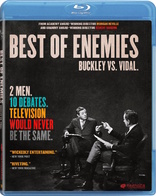
Price
List price:Amazon: $11.99 (Save 11%)
Third party: $11.99 (Save 11%)
Only 4 left in stock - order soon.
Movie rating
6.9 | / 10 |
Blu-ray rating
| Users | 0.0 | |
| Reviewer | 4.0 | |
| Overall | 4.0 |
Overview
Best of Enemies (2015)
In the summer of 1968, ABC hired William F. Buckley Jr. and Gore Vidal to debate each other during the Democratic and Republican national conventions. Buckley was a leading light of the new conservative movement, while Vidal was a Democrat and cousin to Jackie Onassis. Each believed the other’s political philosophy was dangerous for America. Like intellectual heavyweights in the ring, they pummeled out policy and personal insult, live and unscripted. Ratings for ABC News skyrocketed, and a new era in public discourse was born.
Starring: Dick Cavett, Gore Vidal, Christopher Hitchens, Noam Chomsky, William F. BuckleyNarrator: John Lithgow, Kelsey Grammer
Director: Morgan Neville, Robert Gordon (IX)
| Documentary | 100% |
Specifications
Video
Video codec: MPEG-4 AVC
Video resolution: 1080p
Aspect ratio: 1.78:1
Original aspect ratio: 1.85:1
Audio
English: DTS-HD Master Audio 5.1 (48kHz, 24-bit)
Subtitles
English SDH, French, Spanish
Discs
50GB Blu-ray Disc
Single disc (1 BD)
BD-Live
Playback
Region A (B, C untested)
Review
Rating summary
| Movie | 4.5 | |
| Video | 4.0 | |
| Audio | 4.0 | |
| Extras | 3.5 | |
| Overall | 4.0 |
Best of Enemies Blu-ray Movie Review
War of the Words
Reviewed by Michael Reuben November 5, 2015The adversarial style of political discourse that is standard fare on television may seem like a recent phenomenon, a product of audience fragmentation, cable TV and the internet, but in fact it dates back to the medium's early days. Politics and TV have long shared a mutually beneficial, if sometimes tempestuous, relationship, even when there were only three major networks. The 1960 Presidential campaign saw the first nationally televised debate, which helped propel a telegenic junior senator from Massachusetts into the White House. In the 1964 campaign, the incumbent President ran some of the sharpest attack ads ever crafted against his opponent, to great effect. And in 1968, the ABC network, in a desperate gamble to break out of a ratings slump, hired two famous intellectuals to debate each other during the Presidential nominating conventions, thereby providing something that CBS and NBC didn't have. What happened next riveted viewers and changed the face of TV. Best of Enemies is the engrossing documentary by Robert Gordon and Morgan Neville (20 Feet from Stardom) that examines this historic on-air confrontation between William F. Buckley Jr., the founder and intellectual spokesman for modern American conservatism, and Gore Vidal, novelist, iconoclast and vocal opponent of everything Buckley stood for. The two commentators were supposed to discuss the nominating conventions, but as the lengthy excerpts from their ten appearances show, they often ignored that assignment and went straight for each other's throats. By the time they were done, violence had been threatened and personal slurs exchanged. Both men would continue writing about it (and suing each other) for years to come. Meanwhile, ABC's ratings soared, and their competitor networks hastened to adapt their format. The era of argument, confrontation and point/counterpoint was born.
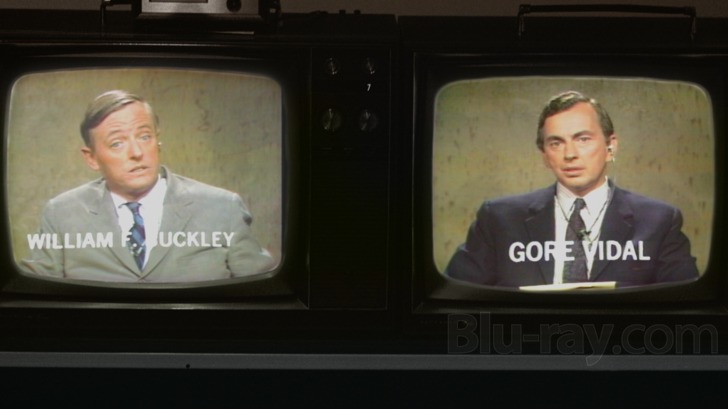
Gordon and Neville spent five years searching through archives and taping interviews with people who knew Buckley and Vidal in an effort to construct a fully rounded portrait of both men and the circumstances surrounding their on-air battle. Buckley had already passed away when they began (in 2008 at the age of 82), but Vidal was still alive and agreed to sit for an interview, which the filmmakers ultimately did not use; he died in 2012 at the age of 86. Fortunately, both men had led such active public lives that there is no shortage of footage from multiple eras, as well as revealing and informative interviews from such subjects as Buckley's brother, Reid; former talk show host Dick Cavett, who knew both men; former ABC publicist George Merlis, who participated in the 1968 event; and both men's biographers. Actor Kelsey Grammer reads excerpts from Buckley's writings on the soundtrack, reproducing Buckley's distinctive cadence with remarkable accuracy. Actor John Lithgow performs excerpts from Vidal's work, and although he sounds nothing like the late writer, Lithgow delivers Vidal's writing with the same panache that can be observed in Vidal's numerous appearances on film and videotape. Both Buckley and Vidal arrived at their confrontation as accomplished, energetic and controversial individuals. Both of them moved in elite circles. A devout Catholic and a Yale graduate, Buckley achieved early fame with his first book, the autobiographical God and Man at Yale, in which he criticized his university's liberal bent. Another 49 books followed, along with dozens of articles, many of them for The National Review, the magazine he founded and edited until just before his death. He also hosted the TV program Firing Line for 30 years. A polished speaker noted for his extensive vocabulary and classical education (he attended mass in Latin), he was a popular guest on late night talk shows and a formidable debater. Vidal came from a political family. His grandfather was the first senator from Oklahoma. Jackie Kennedy was his stepsister, and Vidal was an insider at the Kennedy White House until he quarreled with Bobby Kennedy (as he would quarrel with many others throughout his life). A prodigious reader and a prolific writer, he produced plays, articles, film scripts and novels. Unlike Buckley, whose political beliefs were firmly rooted in traditions of church, family and social order, Vidal was a habitual critic of the establishment. His second novel, The City and the Pillar, published in 1948, so scandalized the literary world with its frank depiction of homosexuality that the New York Times refused to review it. Myra Breckinridge, which appeared just before the 1968 debates, featured a transsexual heroine and, while it offended many traditional readers, it sold millions of copies. In their on-air confrontations, Buckley routinely referred to Vidal as "the author of Myra Breckinridge", as if that alone were sufficient condemnation. But as one observer notes in the supplemental interviews, Buckley probably sold another thousand books with every reference—and Vidal knew it. Both Buckley and Vidal had tried running for office—Buckley for Mayor of New York and Vidal for Congress—but neither had won. By the time they appeared together on ABC, they had both been forced to accept their roles as political observers and commentators rather than participants. They had one more critical thing in common: each thought the other was evil incarnate. Watching the excerpts from their confrontations, you can observe the unmistakable body language and facial expressions of people who are no longer thinking rationally but speaking and acting out of passion and, ultimately, fury. Everything builds to the famous moment when, in the ninth of ten debates, after demonstrators and police clashed at the Democratic National Convention in Chicago (captured in the film Medium Cool), Buckley loses control and responds to Vidal's calling him a "crypto-Nazi" by threatening to punch him. Even more shocking was Buckley's language: "Now listen, you queer. Stop calling me a crypto-Nazi, or I'll sock you in the goddamn face, and you'll stay plastered!" (Note Vidal's expression immediately afterward; he knows he's winning the fight merely by keeping his composure, although he reportedly looked shaken after leaving the studio.) As Dick Cavett comments today, "The network nearly shat." One of the most provocative questions explored in Best of Enemies is how two of the most intelligent and articulate people in America could have been reduced to such an exchange before an audience of millions, and why, at their angriest moment, the issue that exploded was sexual orientation. (The "Additional Interviews" in the extras explore this point in even greater detail.) As several of the commentators observe, all of the issues that Buckley and Vidal debated are still with us today, in one form or another. Indeed, some of the language from the debate excerpts could have been lifted from a contemporary discussion. Both Buckley and Vidal must have sensed that they had tapped into a deep well of ideology that would power social and political conflict for a long time to come. Why else would they have kept arguing with each other, in print and in court, for years? While Buckley would later apologize for calling Vidal a "queer", he never relented from his critique of Vidal's homosexuality (or bisexuality, since Vidal refused to let himself be labeled), writing that "[t]he man who, in his essays, proclaims the normalcy of his affliction, and in his art the desirability of it, is not to be confused with the man who bears his sorrow quietly". Vidal, by contrast, proudly maintained that the two things one should never turn down are sex and appearing on television. Asked for a comment at Buckley's death, he declared that "hell is bound to be a livelier place, as he joins, forever, those whom he served in life, applauding their prejudices and fanning their hatred". If there is an afterlife that permits it, each of them is probably still trying to have the last word.
Best of Enemies Blu-ray Movie, Video Quality 
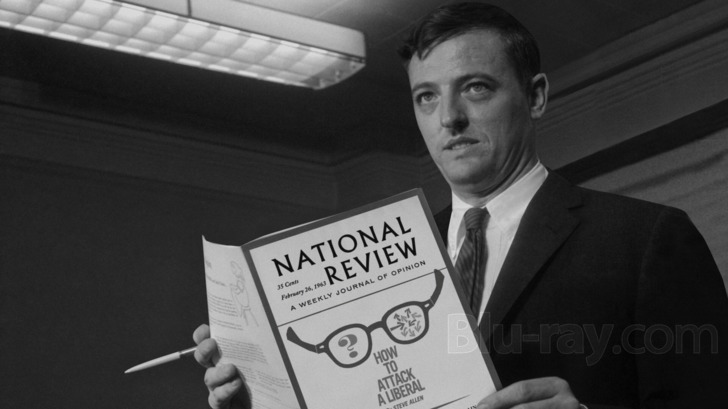
Although the contemporary interviews for Best of Enemies were shot on hi-def video, the bulk of the film consists of a variety of archival sources: still photos, videotape, kinescopes, newsreel footage and other filmed formats, usually in less-than-pristine condition. Digital manipulation and color correction have knitted these disparate elements together as effectively as possible to create a smooth flow, as directors Gordon and Neville build up their twin portraits of Buckley and Vidal like a pair of opposing mosaics. Magnolia Home Entertainment's 1080p, AVC-encoded Blu-ray has presumably been sourced from the same digital master used for the final film. The newly recorded interviews have the sharpness, detail and polish that one expects from recent HD footage, and the remainder varies according to the quality of the source. The most important challenge for Blu-ray is to render these images, warts and all, without adding any additional problems by way of distortion or compression artifacts. Magnolia has mastered the film with an average bitrate of 29.99 Mbps, and the compression appears to have been capably performed. Best of Enemies looks as good as it possibly can.
Best of Enemies Blu-ray Movie, Audio Quality 
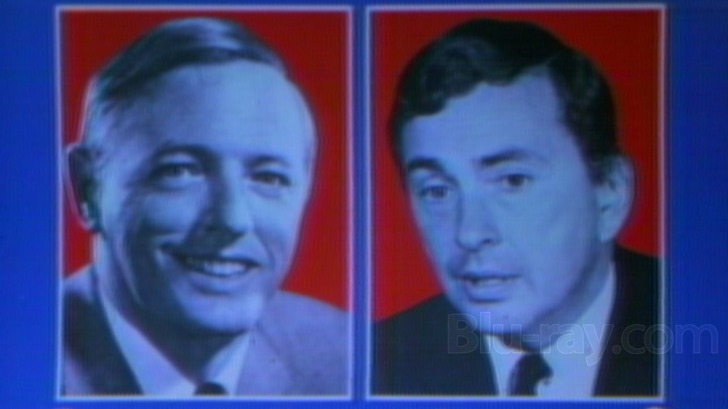
The film's 5.1 soundtrack has been encoded in lossless DTS-HD MA. As with most documentaries, the sound is front-oriented, with the voices locked to the center channel and the left and right devoted to the score by Jonathan Kirkscey, whose style here sometimes recalls Philip Glass and at other times sounds like the Wendy Carlos electronic soundtrack for A Clockwork Orange. However, there is one critical moment when Best of Enemies makes a distinctive use of the 5.1 format, or, more specifically, the ".1" part of it. You'll know it when you get there, because the bass extension is very deep, for both the musical score and key sound effects that have been added to the news footage. If you have a good subwoofer, the room may vibrate.
Best of Enemies Blu-ray Movie, Special Features and Extras 
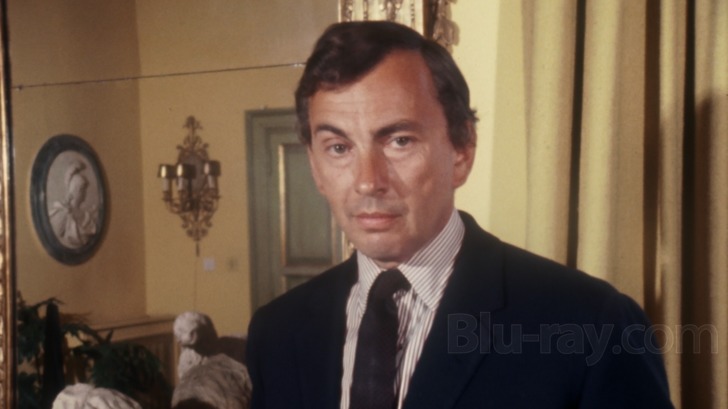
- Additional Interviews (1080p; 1.78:1; 1:05:40): A "play all" function is included. These interview excerpts provide further perspectives, frequently conflicting, on the Buckley/Vidal debates, their context and subsequent history.
- Andrew Sullivan
- Christopher Hitchens
- Dick Cavett
- George Merlis
- James Wolcott
- Lee Edwards
- Lynda Bridges
- Matt Tyrnauer
- Reid Buckley
- Sam Tanenhaus
- Interview with Directors Morgan Neville and Robert Gordon (1080i; 1.78:1; 7:13): The filmmakers describe the history of the project, their goals and the surprises and discoveries they encountered during the lengthy process.
- Theatrical Trailer (1080p; 1.78:1; 2:23).
- Also from Magnolia Home Entertainment: The disc includes trailers for The Wolfpack, Drunk Stoned Brilliant Dead: The Story of the National Lampoon, Steve Jobs: The Man in the Machine and Experimenter, as well as promos for the Chideo web service and AXS TV. These also play at startup, where they can be skipped with the chapter forward button.
- BD-Live: As of this writing, attempting to access BD-Live gave the message "Check back for updates".
Best of Enemies Blu-ray Movie, Overall Score and Recommendation 
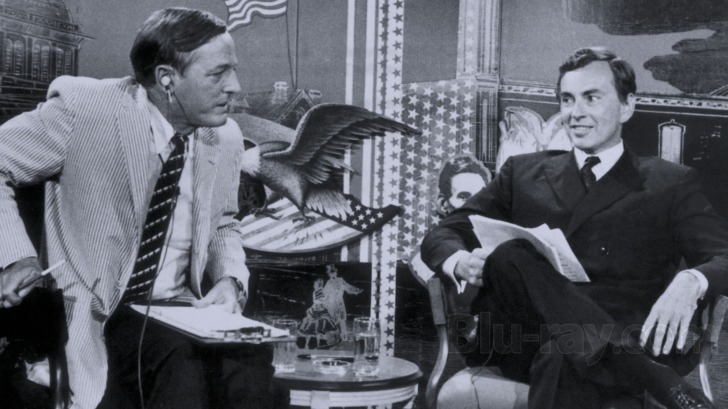
Best of Enemies is a wonderful example of how a documentary can be entertaining without the filmmakers injecting themselves into the scene. Of course, Neville and Gordon had an unfair advantage, because their two subjects were among the most interesting public figures of the 20th Century who were not athletes, entertainers or elected officials. Intellectuals have not been traditionally popular in America; so for someone to achieve the kind of public reputation that both Buckley and Vidal attained requires an exceptional degree of talent and perseverance (not to mention luck). As nemeses, they were made for each other. Highly recommended.
Similar titles
Similar titles you might also like
(Still not reliable for this title)

I Am Not Your Negro
2016

Won't You Be My Neighbor?
2018

RBG
2018

Waiting for "Superman"
2010

Dawson City: Frozen Time
2016

De Palma
2015

Fahrenheit 11/9
2018

Where to Invade Next
2015

Fahrenheit 9/11
2004

Cameraperson
2016

Shock and Awe
2017

The Fog of War: Eleven Lessons from the Life of Robert S. McNamara
2003

Life Itself
2014

American Experience: Freedom Riders
2011

An Inconvenient Sequel: Truth to Power
2017

Drunk Stoned Brilliant Dead: The Story of the National Lampoon
2015

Citizenfour
2014

The Dog
2013

Why We Fight
2005

The Gatekeepers
2012